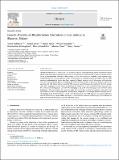Files in this item
Genetic diversity of Mycobacterium tuberculosis clinical isolates in Blantyre, Malawi
Item metadata
| dc.contributor.author | Ndhlovu, Victor | |
| dc.contributor.author | Kiran, Anmol | |
| dc.contributor.author | Sloan, Derek | |
| dc.contributor.author | Mandala, Wilson | |
| dc.contributor.author | Kontogianni, Konstantina | |
| dc.contributor.author | Kamdolozi, Mercy | |
| dc.contributor.author | Caws, Maxine | |
| dc.contributor.author | Davies, Gerry | |
| dc.date.accessioned | 2019-10-21T11:30:09Z | |
| dc.date.available | 2019-10-21T11:30:09Z | |
| dc.date.issued | 2019-10 | |
| dc.identifier | 262151343 | |
| dc.identifier | 50e51096-c609-40f1-8064-00bf37585275 | |
| dc.identifier | 85072967420 | |
| dc.identifier | 000494641300101 | |
| dc.identifier.citation | Ndhlovu , V , Kiran , A , Sloan , D , Mandala , W , Kontogianni , K , Kamdolozi , M , Caws , M & Davies , G 2019 , ' Genetic diversity of Mycobacterium tuberculosis clinical isolates in Blantyre, Malawi ' , Heliyon , vol. 5 , no. 10 , e02638 . https://doi.org/10.1016/j.heliyon.2019.e02638 | en |
| dc.identifier.issn | 2405-8440 | |
| dc.identifier.other | ORCID: /0000-0002-7888-5449/work/63716873 | |
| dc.identifier.uri | https://hdl.handle.net/10023/18720 | |
| dc.description | This work was supported by The Helse Nord Tuberculosis Initiative (HNTI). | en |
| dc.description.abstract | Despite the high burden of tuberculosis (TB) worldwide, specific factors influencing disease transmission remain elusive. Long term epidemiological studies and in vitro experimental models provide evidence of variable relative fitness of Mycobacterium tuberculosis (Mtb) strains but few such studies are available. Large sequence polymorphisms (LSP) are a robust molecular marker and are feasible as an epidemiological investigative tool. Few Mtb molecular epidemiological studies have been reported in Malawi owing to lack of laboratories with molecular tools. We characterized the genetic diversity of Mtb clinical isolates amongst TB patients in Blantyre, Malawi. We genotyped 64 Mtb clinical isolates using LSP-PCR, assigned specific lineages and confirmed 18 of the isolates using SMRT sequencing. The 64 isolates clustered into 4 lineages (L1-L4) with L4 predominating. There were 10/64 (16%) isolates belonging to L1, 6/64 (9%) belonging to L2, 2/64 (3%) belonging to L3 and 46/64 (72%) belonging to L4. Comparison with a previous study done in Karonga revealed concordance in L1 and L4 but discodance in L2 and L3. The phylogenetic tree constructed, comprised of 3/4 lineages present in Blantyre with 3/18 belonging to L1, 3/18 belonging to L2 and 12/18 belonging to L4. Four Mtb lineages were present in Blantyre with L4 predominating. Larger studies are needed to understand the molecular epidemiology of TB in Blantyre in light of increased bi-directional migration with South Africa. | |
| dc.format.extent | 5 | |
| dc.format.extent | 369362 | |
| dc.language.iso | eng | |
| dc.relation.ispartof | Heliyon | en |
| dc.subject | Bioinformatics | en |
| dc.subject | Clinical genetics | en |
| dc.subject | Genetics | en |
| dc.subject | Infectious disease | en |
| dc.subject | Large sequence polymorphisms | en |
| dc.subject | Microbiology | en |
| dc.subject | Mycobacterium tuberculosis | en |
| dc.subject | Region of difference | en |
| dc.subject | Single molecule real time sequencing | en |
| dc.subject | Single nucleotide polymorphism | en |
| dc.subject | QR Microbiology | en |
| dc.subject | QH426 Genetics | en |
| dc.subject | NDAS | en |
| dc.subject | SDG 3 - Good Health and Well-being | en |
| dc.subject.lcc | QR | en |
| dc.subject.lcc | QH426 | en |
| dc.title | Genetic diversity of Mycobacterium tuberculosis clinical isolates in Blantyre, Malawi | en |
| dc.type | Journal article | en |
| dc.contributor.institution | University of St Andrews. School of Medicine | en |
| dc.contributor.institution | University of St Andrews. Infection and Global Health Division | en |
| dc.identifier.doi | https://doi.org/10.1016/j.heliyon.2019.e02638 | |
| dc.description.status | Peer reviewed | en |
This item appears in the following Collection(s)
Items in the St Andrews Research Repository are protected by copyright, with all rights reserved, unless otherwise indicated.

